At the end of last month, 5,000 people marched through Dublin to protest against the imposition of a €100 (£80) household tax that the Irish government was already struggling to collect from voters sick of austerity measures imposed on a stagnating economy.
It was a small demonstration by the standards of some that have taken place across Europe in recent months – in places such as Syntagma Square in Athens, or in Spanish cities during the general strike that took place just before the Dublin protest – but numbers on the streets are not everything these days.
As polls in Ireland revealed last week, support for the coalition government's policies is collapsing, while backing for Sinn Féin – which is calling for a "no" vote in next month's referendum on the EU fiscal compact that would bind member states other than the UK, which opted out, to budget deficits of 3% or less in perpetuity – has propelled it into the rank of Ireland's second most popular party after Fine Gael. Whether there will still be a fiscal compact to vote on, when the Irish go to the polls, is a moot point. The likely winner of the second round of the French presidential elections next Sunday, the Socialist, François Hollande – who some polls put nine points ahead of the incumbent, Nicolas Sarkozy – has said he would revise the deal.
In recent days, the Dutch coalition government has been brought down by the departure of Geert Wilders's far-right Freedom party, which was unwilling to sign up to a budget in line with the EU's belt-tightening package, even though the Dutch government has been one of the most aggressively in favour of imposing harsh austerity measures on members such as Greece and Portugal. Indeed, opinion polls in the Netherlands suggest that if elections – set for September – took place today, parties opposing the austerity regime might, both to the left and far right, win up to a third of seats.
While some analysts have pointed to Hollande's emergence as the leader of a pan-European anti-austerity movement, others believe that something more complex is occurring – a "game-changing moment" in Europe in which individual electorates are emboldened to push back and debate new strategies by events they see taking place in other countries. What is being demanded by voters, as European debt has continued to balloon along with unemployment, even as growth has evaporated, is nothing less than a "Plan B" – an alternative to the dominant anti-austerity drive. Significantly, for the first time those calls are gaining real traction.
"The one thing you notice," says Eoin O'Malley, a politics lecturer at Dublin City University researching reactions to the European crisis, "is how the push back in one country [against austerity] is influencing politics elsewhere. You see Hollande's comments in France and the fall of the Dutch government influencing how voters here see the Irish referendum on the fiscal compact and believing increasingly they can say no. If you ask me now, I would bet that a no vote was more likely than it was last week."
In just a few weeks, the long-running European debt catastrophe that has stumbled from summit to bailout to the fall of governments has been transformed into a far more corrosive crisis of legitimacy that is increasingly pitting electorates against the established political castes. From London to Madrid, from the EU's northern core to its periphery, voters have begun to resist policies tightly predicated on targets and deadlines for reducing debt to satisfy the markets and ratings agencies that have no means for encouraging growth.
While in London and Berlin politicians and officials have stuck to the script – that there is no Plan B – elsewhere the past few weeks have seen increasing signs that senior EU and government officials are rapidly waking up to the risks posed to the EU by the new public mood of resistance. This has seen politics return to reassert itself in a crisis that has for long been dominated by economic considerations and has led to the fall of five European governments so far.
Last Wednesday, the Wall Street Journal quoted unnamed officials tentatively suggesting that a debate had begun on whether to soften the 2009 targets for reducing debt to 3% of GDP by 2013. "The debate is not to be excluded," the paper quoted one EU official as saying, "but it could give a signal that we are easing up at a time when we are struggling to show that we can keep the system."
By Friday, that debate – initiated by Hollande – had been taken up in unexpected places. Mario Monti, the technocratic prime minister of Italy installed precisely to pursue an austerity regime, became the latest leader to criticise a policy focused only on cutting. "If there is no demand, growth will not materialise. All the reforms we are putting in place now are deflationary," he said.
Last Thursday, the president of the European Council, Herman Van Rompuy, said that growth needed to be pushed to the front of the debate, although he later cautioned: "There are no magic formulas." He was responding to the European Central Bank's Mario Draghi, who on Wednesday told the European parliament's economic and monetary affairs committee that a fiscal compact needed to be followed by a "growth compact".
It is a debate that has been accompanied by loud and febrile commentary from economists and analysts in the media, who have become emboldened to declare Europe's much-heralded bailout, less than two months old, stillborn.
In the New York Times last week, Nobel prizewinning economist Paul Krugman – long at the forefront of criticising austerity measures – denounced the failed "zombie economic policies" of Europe's (and America's) "austerians".
In the Financial Times, José Ignacio Torreblanca, of the European Council on Foreign Relations, reflecting a growing view even within the conservative Spanish administration of Mariano Rajoy, whose government's credit rating was on Friday downgraded a second time, announced: "Time to say 'basta' to the nonsense of austerity."
None of which is what Germany and its chancellor, Angela Merkel, want to hear before a key vote in May in the German parliament that would not only approve the fiscal compact, but even more importantly, the European Stability Mechanism – the region's new emergency bailout fund. Other events on the horizon include elections in Greece and the French legislative elections in June, all of which threaten to turn a growing anti-austerity moment, underpinned by rising populism, into a major crisis.
If there is one place, however, where the anti-austerity backlash is not being felt, it is in Germany, where the prescription from politicians and central bankers for Europe's problem cases remains largely unchanged. It was reiterated in comments to the New York Times last week by Jens Weidmann, president of the Bundesbank and formerly a top adviser to Merkel, who warned that agreements previously made must be respected, even at the loss of some "national sovereignty". Ulrike Guérot, a colleague of Torreblanca and senior research fellow and representative for Germany on the European Council on Foreign Relations, explains: "It is different for the German government. It can still withstand the wider sense of political crisis because there is no unemployment at 50%, as there is in Spain, and no rising political populism."
Despite that, she believes that outside Germany "a game change is coming" that Merkel will not be able to ignore. While Guérot believes that the rapid change in the tone of the debate may cause a moment of political crisis for Europe, she also argues that the imminent ending of "Merkozy" – the lockstep relationship between France and Germany embodied in Merkel and Sarkozy that has driven European economic and political policy – may be a good thing. "What is happening is serious. François Hollande seems to be emerging as a leader of a pan-European anti-austerity movement."
Guérot believes that the "symbiotic relationship" of Sarkozy and Merkel as the driving engine for EU policy may have contributed in large measure to the feeling by many countries and electorates that they were being excluded from the debate. "There is an advantage to the end of the Merkel-Sarkozy relationship in that it will open up room for new disputes, new ideas and new debate." Not least, she adds, over a necessary realignment in the relationship between democracy in the EU and the influence of the markets. "We are not talking growth versus austerity. The debate is over what kind of growth we need." And, she adds, over whether the targets in the fiscal compact are too tight. "We can't just save. We need to invest. The world isn't going to end if the 3% target is missed by a few points next year."
While some argue that a full-blown political crisis in Europe that leads to a rejection of the German-led austerity measures might force a crisis in Germany over Europe, Guérot believes that the most likely outcome is a renegotiation. "Merkel is a survivor and pragmatic. And I think Hollande knows that he will need an accommodation, too. If this fiscal compact falls – if there is a second version – it will have to be faced."
While analysts such as Guérot might be relaxed about such an outcome, for those politicians at the heart of the growing storm the stakes could not be higher. On Friday, in Dublin, it was the turn of Ireland's deputy prime minister Eamon Gilmore, whose Labour party has been crucified in opinion polls for its support for austerity, to use apocalyptic language, warning that Ireland would not have access to any alternative funding if next month's fiscal treaty is rejected.
The real question is whether Ireland's – or Europe's – voters, after years of pain, still have the stomach for this message.
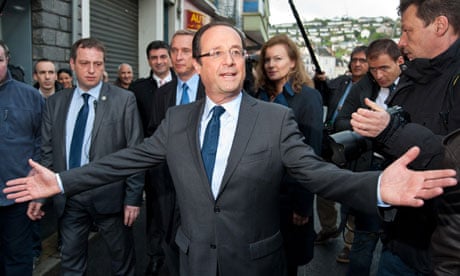
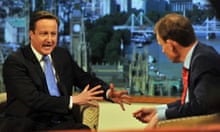
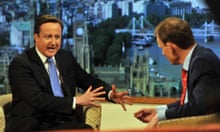

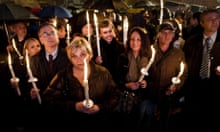





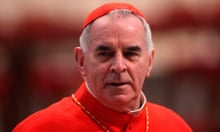
Comments (…)
Sign in or create your Guardian account to join the discussion